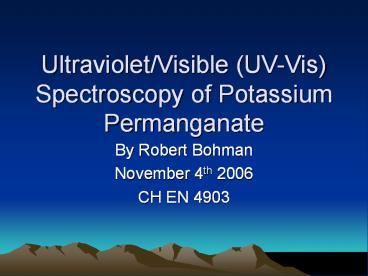Ultraviolet/Visible (UV-Vis) Spectroscopy of Potassium Permanganate - PowerPoint PPT Presentation
Title:
Ultraviolet/Visible (UV-Vis) Spectroscopy of Potassium Permanganate
Description:
Potassium Permanganate is used to kill bacteria in reclaimed water ... Used cuvette of 1cm length. e = slope of line = 0.029 ppm-1 cm-1 ... – PowerPoint PPT presentation
Number of Views:3671
Avg rating:3.0/5.0
Title: Ultraviolet/Visible (UV-Vis) Spectroscopy of Potassium Permanganate
1
Ultraviolet/Visible (UV-Vis) Spectroscopy of
Potassium Permanganate
- By Robert Bohman
- November 4th 2006
- CH EN 4903
2
Importance to industry
- Potassium Permanganate is used to kill bacteria
in reclaimed water - Use UV-Vis to ensure that the concentration of
Potassium Permanganate is at acceptable limit
3
Overview
- Theory
- Light Absorption Spectrum
- Experimental Procedure
- Results
- Conclusion
- Q A
4
THEORY
5
Properties of Light1
- c ??
c speed of light in vacuum (2.998 x
108 m/s) - ? wavelength (m)
- v frequency (Hz)
- E hc/ ? hcv
h Plancks constant (6.626 x
10-34 Js) - v wavenumber (m-1)
6
Understanding Beers Law2
- Transmittance T P/P0
- Schematic of Single-Beam Spectrophotometer, P0 is
the irradiance entering sample, P is the
irradiance leaving sample, and b is pathlength2 - P irradiance (energy per unit area of light
beam)
7
Understanding Beers Law3
- Absorbance A log (P/P0) -log (T)
- Beers Law A ebc
- e molar absorptivity (M-1 cm-1)
- b pathlength (cm)
- c concentration (M)
8
LIGHT ABSORPTION SPECTRUM
9
Absorption Spectrum of Light4
Wavelength of maximum absorption (nm) Color Absorbed Color Observed
380 420 Violet Green-Yellow
420 - 440 Violet-Blue Yellow
440 470 Blue Orange
470 500 Blue-Green Red
500 520 Green Purple
520 550 Yellow-Green Violet
550 580 Yellow Violet-Blue
580 620 Orange Blue
620 680 Red Blue-Green
680 - 780 Purple Green
10
EXPERIMENTAL PROCEDURE
11
Detecting Potassium Permanganate
- Potassium permanganate (KMn04) in solution is
purple / violet color meaning maximum absorption
should be at 500 550 nm - Prepared 5 known concentrations of KMnO4 1ppm,
20ppm, 40ppm, 60ppm, 80ppm
12
Detecting Potassium Permanganate
- Calibration Standards measured first on a
Perkins-Elmer Lambda 35 over entire UV-Vis region
to determine max absorption - KMnO4 absorbed best at 520 nm
- A Bausch Lomb Spectronic 21 was used to make
all measurements
13
RESULTS
14
(No Transcript)
15
UV-Vis Absorbance Readings for Potassium
Permanganate at 520 nm
Average A (after 3 runs) Standard Deviation (A)
1 ppm 0.015 0.004
20 ppm 0.256 0.001
40 ppm 0.520 0.004
60 ppm 0.753 0.002
80 ppm 1.046 0.001
Unknown 4 0.462 0.001
16
Calibration Curve for KMnO4 using UV-Vis
Spectroscopy, Absorption vs. Concentration
17
Determination of Unknown Concentration of KMnO4
- Used cuvette of 1cm length
- e slope of line 0.029 ppm-1 cm-1
- Unknown 4 concentration found using
- c A/0.029
- 36 ppm 0.462 A / 0.029 ppm-1
18
Error Analysis
- Used 10.00 0.05mL volumetric pipette to make
all solutions - Measured density of water with
- ? (999.8392 16.945176t 7.987040110-3t2
46.17046110-6t3 105.5630210-9t4
280.5425310-12t5)/(1 16.87985010-3t)5 - ?H2O 0.997883 g/mL at 21.5C
- Measured accuracy of scale to be ? 0.0005g
19
Error in Unknown
- Errors determined graphically from calibration
curve - A 0.01
- Concentration 1.00 ppm
- Final concentration of Unknown 4 was
- 36 1.00 ppm
20
CONCLUSION
21
Conclusion
- How accurate are results?
- Can be determined by R2 value for slope of
calibration curve. - For this example R2 0.999
22
Conclusion
- Use Beers law to determine concentration of
unknown concentration - Find the molar absorptivity through the slope of
calibration curve - Determined e 0.029 ppm-1 cm-1
- Determined Unknown 4 concentration to be 36
1.00 ppm
23
Q A
24
Special Thanks
- To Triston Thorpe and Jason Judkins in helping
with the experiment
25
References
- Harris, Daniel C. Sixth Edition Quantitative
Chemical Analysis. Pg. 408-409. New York W.H.
Freeman and Company, 2003. - Harris, Daniel C. Sixth Edition Quantitative
Chemical Analysis. Pg. 410. New York W.H.
Freeman and Company, 2003. - Harris, Daniel C. Sixth Edition Quantitative
Chemical Analysis. Pg. 411-412. New York W.H.
Freeman and Company, 2003. - Harris, Daniel C. Sixth Edition Quantitative
Chemical Analysis. Pg. 413. New York W.H.
Freeman and Company, 2003. - 5. CRC Handbook of Chemistry and Physics. Pg.
F-6. Cleveland, Ohio The Chemical Rubber Co.,
1968.
26
Relax































